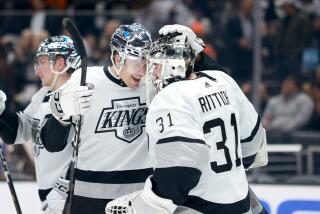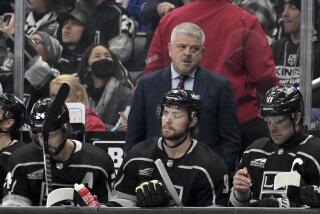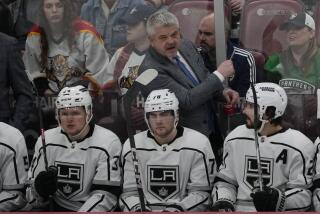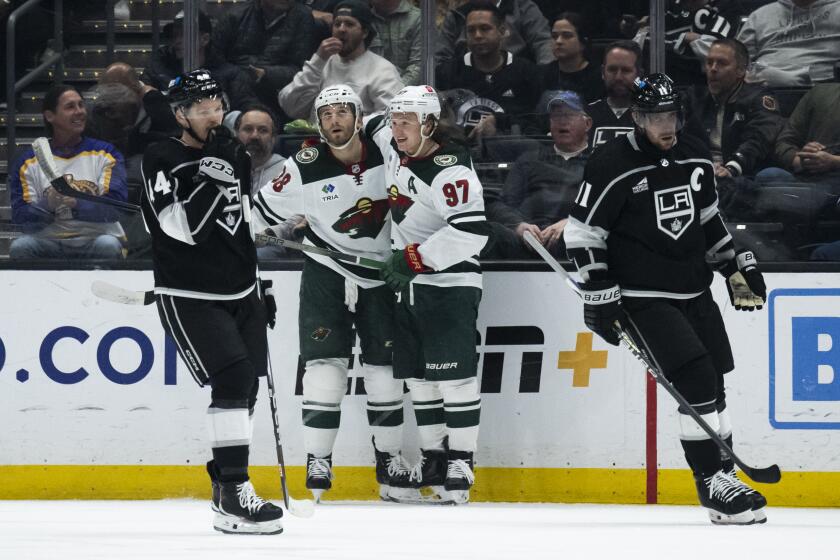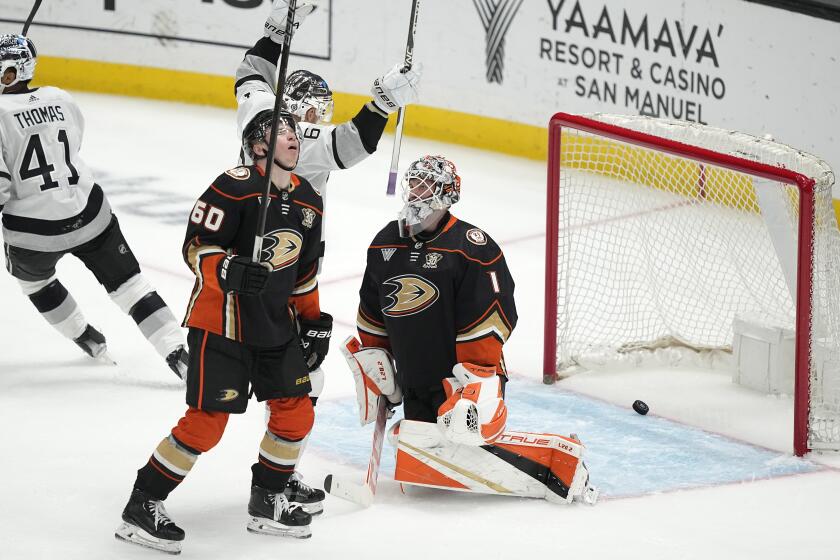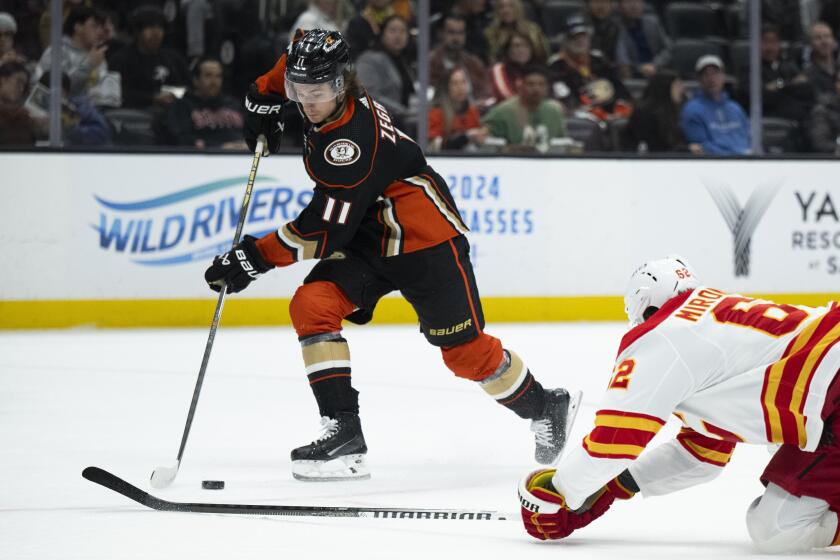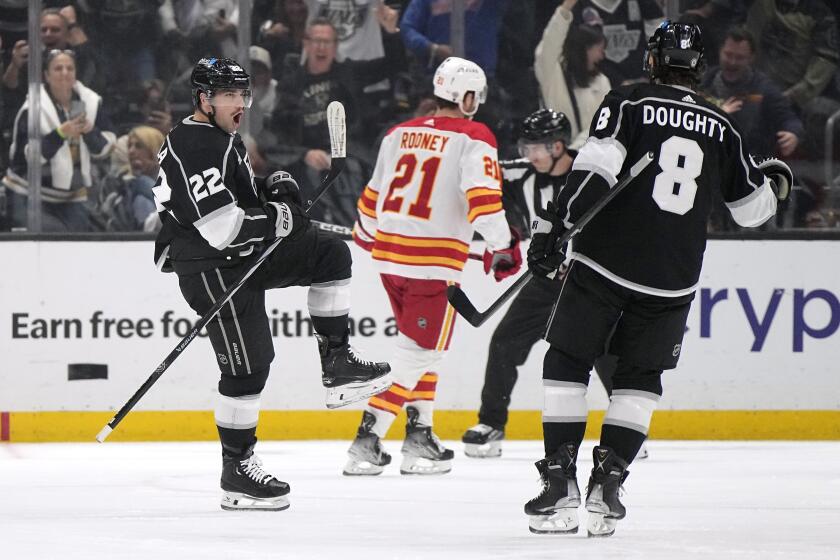Column: Kings face obstacles in quest for back-to-back Stanley Cup championships
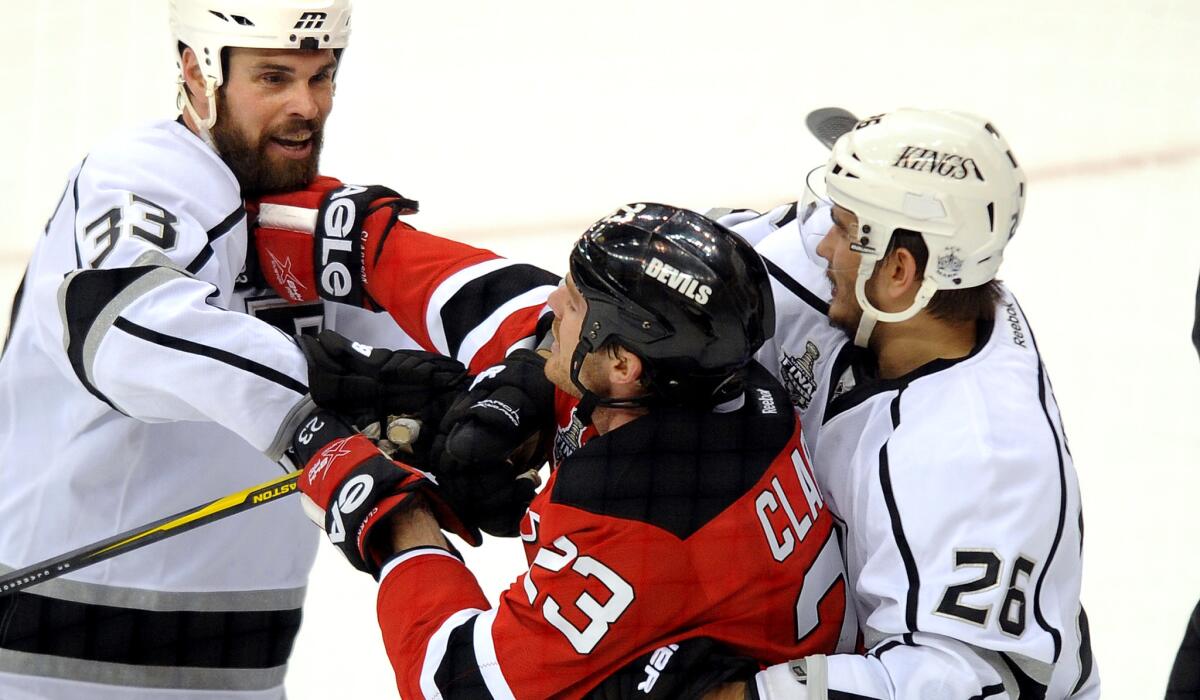
Winning the Stanley Cup might be the most demanding task in professional sports, a glorious and grueling test played out over eight months and more than 100 games.
Only when the ice has melted do teams disclose who was hobbling on a wounded knee or who was tethered to an IV between games. Lifting the Cup with aching arms above your bruised shoulders makes it all worthwhile.
Winning the Cup twice in a row, though, is even tougher.
The NHL — once a haven for dynasties built by Montreal, Edmonton and the New York Islanders — hasn’t had a repeat champion since the Detroit Red Wings in 1997 and 1998. Since then, the NBA (Bulls, Lakers and Miami Heat), NFL (Denver and New England) and Major League Baseball (the New York Yankees) have all had repeat winners.
The Kings have come closest by winning in 2012, reaching the Western Conference final in 2013 and reclaiming the Cup last spring, but to repeat this season, they’ll first have to climb into a playoff spot.
“I think dynasties are over. There’s no doubt about it,” said Jimmy Devellano, senior vice president of the Red Wings. And he should know. His name is on the Cup as a scout and assistant general manager for the first three of the Islanders’ four straight titles in the 1980s, and four more times as a Detroit executive.
“It’s a credit to L.A. and Chicago that in the last five years they both won two, and Boston snuck in there for one,” Devellano said. “I guess it could happen for L.A., but it’s been a tough, tough year. It doesn’t take much to take you off your game.”
What has taken the Kings off their game?
Start with the likelihood of fatigue. They’ve played 64 playoff games the last three seasons, the most by any NHL team in a three-season span. Dallas played 63 playoff games from 1997-98 through 1999-2000, as did Detroit from 2006-07 through 2008-09.
“It’s a lot of games,” said Luc Robitaille, the Kings’ president of business operations and a Cup champion with Detroit in 2002. “And you look at last year, we had a lot of guys that played in the Olympics. It takes a toll on a player over time.”
Rob Blake, the Kings’ assistant general manager, also knows the obstacles facing would-be repeat winners. He triumphed in 2001 with the Colorado Avalanche, which lost to Detroit in Game 7 of the West finals the following season.
“Difficult because you become a target. Difficult because of the short summer,” Blake said. “Lots of difficulties, but I think the main thing is being focused to do it again, not being content with one and hoping they do it again.”
Robitaille said Cup winners’ short summer cuts into off-season conditioning and can lead to slow starts the following season.
“When you don’t win the Cup, you have 10 weeks or 12 weeks to work out. When you win the Cup, you might have only four or five weeks to work out, and your whole program changes,” he said. “A lot of times, teams that won the Cup have problems just starting the season…. I don’t believe it’s an excuse, but the games in October, it’s a reality, mentally, as a human being, you don’t think quite the same as when those games are do-or-die.”
But the biggest obstacle to repeating is the NHL’s salary cap, adopted after a labor dispute that led Commissioner Gary Bettman to cancel the 2004-05 season. Success leads players to request raises, but teams have only so much cap space. The Canadiens, Islanders and Oilers never had that restraint.
The cap-squeezed Chicago Blackhawks shed about a dozen players from their 2010 Cup team; they replenished their depth and won again in 2013.
The Kings, facing a similar squeeze last summer, let defenseman Willie Mitchell leave as a free agent. Their defense — which has lost Slava Voynov to a suspension while he faces a felony domestic violence charge — has been a patchwork of inconsistency.
Devellano said the Red Wings wanted to keep Nicklas Lidstrom, Pavel Datsyuk and Henrik Zetterberg in 2009, but to do that, they had to let Marian Hossa go. Hossa signed with the Blackhawks and helped them to two Cup triumphs. The Islanders didn’t have to make those kinds of choices.
“Bill Torrey was able to go to the players and pay them what were top salaries at the time,” Devellano said of the Islanders’ general manager. “We were able to keep them. With all that playoff revenue, that’s how we were able to do it.
“It’s not like the Islander and Edmonton days, where you could hoard a Bryan Trottier, a Denis Potvin and a Mike Bossy, or Edmonton with Mark Messier, Wayne Gretzky and Paul Coffey. It’s hard to have three stars on your team with the way the salary cap is.”
One mistake can clog a team’s cap space and hamper long-term planning. Exhibit A: Kings General Manager Dean Lombardi’s decision last summer not to buy out fading center Mike Richards and his $5.75-million cap hit.
“You really have to be a good manager of the cap,” Devellano said. “And sometimes you’ve got to make unpopular and tough decisions because if you overcommit to somebody in money and in term, it can really come back to bite you in the rear end.”
Yet, the cap isn’t entirely bad. “If it’s done anything,” Devellano said, “it certainly has created terrific parity.”
That’s if you prefer parity to dynasties.
Twitter: @helenenothelen
More to Read
Go beyond the scoreboard
Get the latest on L.A.'s teams in the daily Sports Report newsletter.
You may occasionally receive promotional content from the Los Angeles Times.
